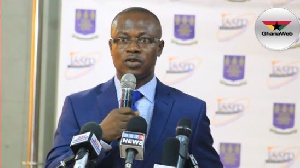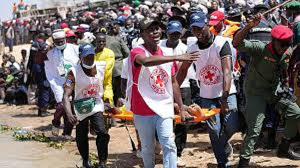General News of Monday, 19 November 2018
Source: ghananewsagency.org
Ghana loses 200 million dollars annually due to floods/droughts
The Probabilistic Risk Profile of Ghana indicates that the country loses 200 million dollars every year due to floods and droughts.
In technical terms, under the current climate, this is an Average Annual Loss, which is more than 200 million dollars.
Ms Katrina Mouakkid Soltesova, the Programme Management Officer of Risk Knowledge, United Nations Office for Disaster Risk Reduction (UNISDR) Regional Office for Africa, said on Monday.
She said projecting to a not so distant future in 2050, the potential Gross Domestic Product to be adversely affected by floods will increase more than five times.
Ms Soltesova was speaking at the opening of a five-day Regional Level Disaster Risk Reduction (DDR) workshop dubbed; “Building Resilience of Natural Hazards in Sub-Saharan African Regions, Countries and Communities”.
It was initiated by the UNISDR, in collaboration with the National Disaster Management Organisation (NADMO), and brought together Ghanaian experts from several ministries and agencies to discuss the Probabilistic Risk Profile (PRP) of Ghana in the face of floods and droughts.
The PRP was conducted by researchers from the CIMA Research Foundation in four African countries namely; Ghana, Kenya, Rwanda, and Angola.
Ms Soltesova said examining specific results related to floods, the agricultural sector would see a loss of 20 million dollars per year, adding that, “this is in absolute terms whereas in relative terms it is a loss of up to 0.3 per cent”.
“Still looking at flood related losses, the highest, in absolute terms, are predicted for the service sector – accounting for 35 million US dollars. It is followed closely by the housing and transportation sectors.”
She noted that some eight per cent of the population are potentially affected in the drought results under the present climate.
“In a future climate and taking into consideration socio-economic projections, the number of affected people could triple to reach 28 per cent of Ghana’s population,” Ms. Soltesova said.
She said that equated to more than 10 million persons per year affected by drought, while potential losses to crops were estimated at 1.1 per cent at present climate conditions and 1.3 per cent under future climate.
Ms Soltesova said: “Our focus, therefore, ought to be on disaster risk proofing of relevant public and private investments, both national and international.”
“Early findings of a DDR-sensitive analysis of Ghana’s national budget indicates that public investment specifically aimed at reducing disaster risk amounts to an annual average of 118 million US dollars.”
“This is roughly two per cent of Ghana’s national budget, an average for the period 2016 to 2018”.
Mr Eric Nana Agyeman-Prempeh, the Director General of NADMO, said the Organisation had not relented in its effort to manage disasters by coordinating government and non-government agencies to improve the livelihood of communities and their resilience to disasters.
“A global momentum is being built up in the area of DRR. We, therefore, need to work together to devise ways and means to mitigate the impact of disasters, ensure sustainable development and save the lives of people,” he said.
“Continuous collaboration of all stakeholders is required to build resilience to natural hazards”.
Ms Christine Evans-Klock, the United Nations Resident Coordinator, in a speech read on her behalf, said it would be appropriate to ensure that national budgets included the cost of advisory services and other disaster response measures based on information generated by the PRP and the disaster loss database.
She said making those provisions would enable the transition to a more holistic, better resourced approach to disaster risk reduction and building resilience.
“There is also a need to find ways to incorporate local knowledge into the risk profiling efforts, as well as to identify innovative ways of transferring knowledge to national and local stakeholders,” she said.
Ms Evans-Klock noted that it was also critical to ensure that investments are risk-informed and aligned with the fight against climate change.
Entertainment











